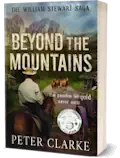The Life of a Prospector.
by Peter Clarke

What followed next were the most difficult, disappointing and exhilarating months of William’s young life.
After a bad start, he became quite the marksman with the pistol. By the time they were done, he could bring down a running kangaroo at fifty paces.
They called in at farms to add to their supplies, and most settlers were pleased to see them. They were usually a little wary at first, expecting William and Reginald to be bushrangers, but when they found it was two prospectors down on their luck, they made them welcome. Once or twice, William and Reginald stayed a few days and helped around the house when the man was away or too sick to attend to his duties. Those were the best days – good food and warm beds. The beds were mostly bark stretched across wooden poles, but they were always better than the cold, hard ground.
Storms came too frequently and many times the rivers were too swollen to cross. Even though Reginald had a compass, William was impressed that he could navigate through the bush. He always seemed to know where they were. William asked him about it once and he said, “We find gold, we better know where it is.”
William wished he’d known more about Reginald before they started but did have to admit to himself that even if he had, it may not have changed anything.
They used William’s tarpaulins, a tent and a groundsheet, which meant they shared the tent. Reginald could make more noise at night with his body than twenty horses in a yard. He blurted, farted, belched, snored, shouted in his dreams, scratched endlessly, and thrashed about as though he was trying to release himself from being bound. From time to time, William couldn’t stand it and slept with the horses on the pretext that Kelly needed attention.
There was nothing nice about Reginald’s eating habits. He slurped and chomped his food, smacked his lips, licked his fingers, took more than his share at any meal and showed little interest in cleaning up afterwards. Not that there was much to clean up. Living was primitive.
On several occasions, they thought they’d struck payable gold. William remembered the excitement when Tom had first shown him how to pan. When it came to panning, William and Reginald were on an equal footing. They never argued about where to look, nor held each other accountable for failure – and there were many failures. But in the moments when the gold would sparkle in a pan, they were the best of friends. They’d grip each other by the arms, holler for joy, and hide their disappointment when the pocket would falter.
“It must be here somewhere,” they would encourage each other, but it never was.
One night, smoking their pipes, sitting on a log by the fire after supper, Reginald said that one of them must be unlucky. “We can’t both be unlucky,” he said. “One of us must be holdin’ the other back.”
“I’ve never heard such rubbish,” said William. “We’ll either find it, or we won’t. It has nothing to do with luck.”
“Then, why do some people find gold and others don’t?”
“I think that’s just how it is.”
“Sounds like luck to me.”
Another night, Reginald said they should stop at the next town they came to and sell the gold they’d found. “It’s not much, but if we sell it, you can get some of your money back.”
“Why don’t we sell it and drink it?”
“No, Tom. We had a deal, and a deal’s a deal.”
William decided that even if he lived two lifetimes, he would never understand Reginald.
Then one night, after a week of disappointments, Reginald told William about himself. He wasn’t drunk. They agreed there was no space to bring whisky, so it was to be a dry exercise. However, Reginald spoke about himself without being prompted and William decided he must have been lonely.
“I was a convict, you know. Not many know it. It’s a shameful thing, so I keep it to meself.”
He paused, and William wondered if he was already thinking he’d said too much. Then he went on, and William realised he was most likely searching for the words.
“I was only young, and I stole some food. My little brother was dyin’ of the hunger. My ma was sick and my da dead, so it fell to me to look after the family. I tried to find work, but there was little work and too many lookin’, so I tried to steal from the market. Went there with the idea of stealin’. Must’ve been like I was holdin’ up a sign, ‘cos they grabbed me straight away and handed me to the traps. They wasted no time sendin’ me ‘ere.”
William asked, “What happened to your mother and brother?”
Reginald shook his head. “I dunno. Dead, I suppose. I wrote some letters, but I never heard back. It was bad, there, Tom. People said it was bad in Ireland, but it’s always been bad in England, if you’re poor.”
“You can read and write though?” asked William, wonder in his voice.
“Enough.”
Again, Reginald paused before continuing.